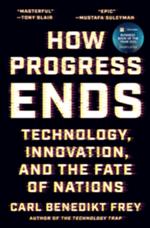In How Progress Ends, Carl Benedikt Frey challenges the conventional belief that economic and technological progress is inevitable. For most of human history, stagnation was the norm, and even today progress and prosperity in the world’s largest, most advanced economies – the United States and China – have fallen short of expectations. To appreciate why we cannot depend on any AI-fuelled great leap forward, Frey offers a remarkable and fascinating journey across the globe, spanning the past 1,000 years, to explain why some societies flourish and others fail in the wake of rapid technological change. By examining key historical moments – from the rise of the steam engine to the dawn of AI – Frey shows why technological shifts have shaped, and sometimes destabilised, entire civilisations. He explores why some leading technological powers of the past – such as Song China, the Dutch Republic, and Victorian Britain – ultimately lost their innovative edge, why some modern nations such as Japan had periods of rapid growth followed by stagnation, and why planned economies like the Soviet Union collapsed after brief surges of progress.

How progress ends: technology, innovation, and the fate of nations
ISBN: 9780691233079
Format: Hardback
Publisher: Princeton University Press (ADS)
Origin: US
Release Date: January, 2026
157254

